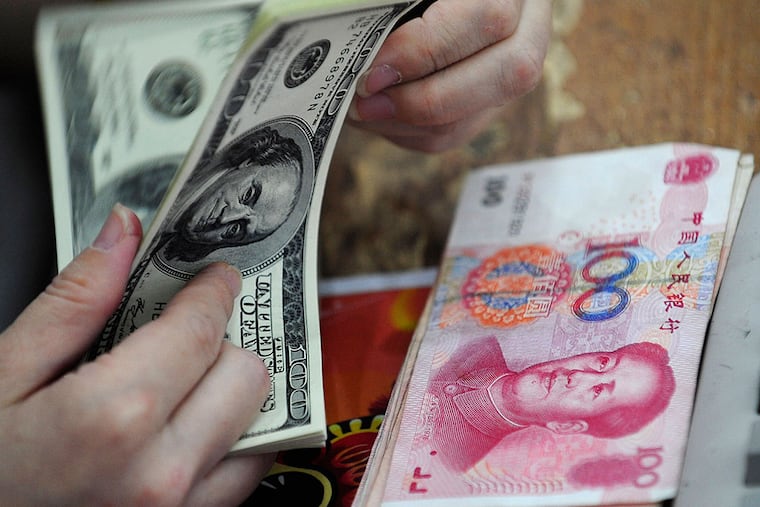Beijing still uneasy with free-market idea
Is it a coincidence that China decided to devalue its currency, the yuan, just a few weeks after its stock market crashed?

Is it a coincidence that China decided to devalue its currency, the yuan, just a few weeks after its stock market crashed?
Dan David doesn't think so. Cofounder of GeoInvesting, a research and investment advisory firm based in Skippack, he is a longtime money manager with China-based portfolio holdings, and he employs a team of researchers there.
David spoke on a panel a month ago and warned that currency devaluation was the Chinese government's next logical step after its stock market collapse.
"They didn't just halt trading on more than half the companies on the A-share market. They stopped major holders from selling. If you're a 5 percent holder [in a public company], you can't sell for six months," he says. "They banned short-selling."
And it wasn't just the market crash that led to the devaluation, he says. It was lots of bumps over the last few years: bad bank loans, a real estate bubble, a stock market bubble, and the ultimate crash of all of those markets.
How does a devaluation help China? Its exports will be cheaper than those of other nations. Though it hurts consumers and savers in China in the short term, the companies who employ those people will ultimately expand revenue and, the hope is, stimulate the economy overall.
With the currency dropping 3 percent in value already, "everyone in China just took a 3 percent pay cut," David explains. "It will hurt consumers there. But China is an export-driven country."
That may help some of David's holdings, such as Canadian Solar (symbol: CSIQ) and Trina Solar (TSL), the world's largest solar-panel manufacturer.
Trina sold 67.3 percent of its products outside China last year and said its 2014 foreign-exchange loss of $21.9 million was mainly due to currency exposure vs. the dollar, according to data from Bloomberg. A depreciating yuan would help Trina's solar-panel sales, which would be cheaper than those sold in dollars.
Is this the beginning of a currency war? Opinions are divided.
David argues unequivocally: "We already are and have been in a currency war with China for some time."
In a statement, Alliance for American Manufacturing president Scott Paul says that China manipulates its currency at the expense of American manufacturers and workers and that in three days China's government wiped out four years of yuan appreciation.
"China once again took matters into its own hands, proving the government and not market forces determine the exchange rate," Paul says. "This latest intervention is not the sign of an economy embracing free-market principles. Quite the opposite, China is boosting its own economy at the detriment of others."
Other strategists believe Beijing actually prefers a gradual devaluation because a single, sharp move could prompt capital flight and undermine China's long-term goal of making the yuan a currency of choice in trade and finance. The yuan would join the U.S. dollar and the euro as international currencies.
For our purposes, says Greg Curtis, founder of $10 billion wealth adviser Greycourt & Co. in Pittsburgh, the important point is that free-market capitalism and China's Communist Party leaders (communist in name only, by the way) just collided on the global stage.
"The one major effort to inject more free enterprise into China - the Shanghai Stock Exchange - has blown up in the party's face. As Chinese stock prices rose higher, Beijing took full credit. But the party missed Adam Smith 101," notes Curtis. (Prior to founding Greycourt, Curtis was president of a family office for a branch of the Mellons.)
Capitalism, in the form of stock markets or otherwise, isn't just about winners, Curtis says.
"True, longer term all boats get floated, but shorter term, there will be winners and losers and rainouts," he says. "For a long time, the Chinese stock market was on a winning streak, but what goes up must come down. And when it came down, it came down with a bang, collapsing 30 percent in a few weeks. A freaked-out Beijing has committed no less than 10 percent of China's entire GDP to artificially propping up the stock market."
GeoInvesting's David allows that since he's a professional trader, he and his partners are comfortable investing in China. But he doesn't advise mom-and-pop investors to do so by themselves.
"Unless you go through a China specialist, it's extremely speculative," he says. "Better to just go to Parx Casino."
215-854-2808 @erinarvedlund